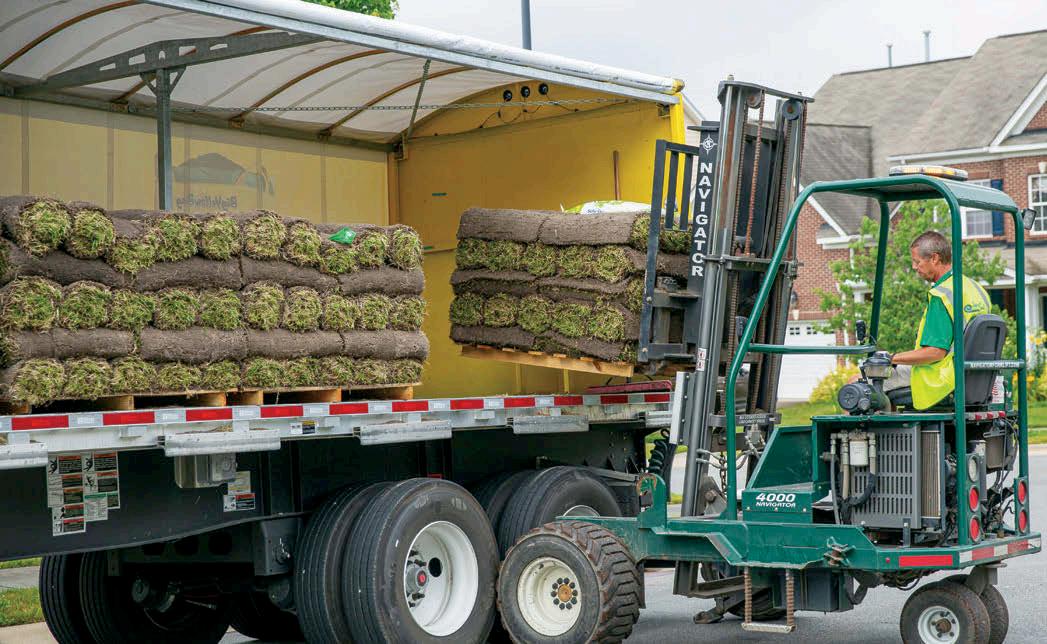
28 minute read
TPI President Steve Griffen
HELP RAISE FUNDS FOR THE LAWN INSTITUTE!
The Lawn Institute (TLI) Fundraiser for TPI’s 2021 Virtual Series will be a Virtual Auction—totally online! Many of you have been “Embracing Transformative Change” this past year by sharpening your online shopping skills. That’s a great warm-up for shopping the array of offerings up for auction in this 2021 fundraiser.
All auction proceeds go to support TLI activities, including public relations, scholarships, natural grass research grants, and development of TLI’s new “Environmental Benefits of Turfgrass Facts.” In addition, the NEW TLI Website, which will be released before the February Virtual Series, is a valuable resource for spreading the word on the many attributes of natural grass. It’s full of valuable lawn care basics, environmental benefits, and it provides an opportunity for TPI members to feature their grasses.
Visit the 2021 Virtual Series on the TPI website for a link to the auction site to view all of the items offered—and to place your bids.
Once the TLI Silent Auction is officially open, bidding will continue online up to the announced ending time on February 19. GiveSmart, the industry-leading fundraising software, is TLI’s easy, user-friendly auction platform. Just like an onsite Silent Auction, bidders will be able to track the current high bids in “real time” so they can keep the bidding going to capture the prize.
If you have questions about the auction process, or need a helping hand, contact Allie Shriver at 847-737-7631 or ashriver@TurfGrassSod.org.
Silent Auction Items Are Needed!
Do you have a great idea for an auction item? Past auctions have included everything from products and equipment for turfgrass production to items for personal enjoyment and recreation. All are welcome!
To learn more about donating items for the online auction or to discuss sponsorship opportunities to benefit The Lawn Institute, contact Allie Shriver at 847-737-7631 or ashriver@ TurfGrassSod.org.


2021 REGISTRATION RATES
Turfgrass Producer Registration Categories Rates
Member Individual Registration $100 Additional Member Registration $50 Member Negotiations Workshop $100
(4-part series)
(4-part series)
Registration includes:
• Access to All Educational Sessions • TWO Virtual Field Days • TPI Annual Member Meeting • Information on the Sod Checkoff Program • and much more!
Important Note: Suppliers are required to exhibit or sponsor to participate in the Virtual Series.
Join Turfgrass Producers International for an immersive digital experience that provides interactive content, networking opportunities and collaboration with peers. This year, our valued sponsors will have a unique opportunity to sponsor this online event with heightened visability. Sponsorship opportunities allow you to gain valuable mindshare of our targeted audience while engaging with TPI’s member community. Together we will continue Growing Forward at TPI’s Education Series, February 2021!
WHO WILL YOUR SPONSORSHIP REACH: Sod Producers and Industry Professionals WHERE: Connect Virtually/Online with Turfgrass industry professionals around the world WHEN: February 16-19, 2021 WHAT: Sponsors! Don’t miss your chance to promote your products or services and generate sales as the world’s top Turfgrass Producers gather on a virtual platform during our 4-day education series, Growing Forward. This series will consist of educational sessions with tracks including executive, marketing and agronomic sessions and your sponsorship visibility will be highlighted throughout!
Bronze
silver
•Logo on TPI website and in all event marketing emails •Acknowledgement in event PowerPoint slides •Identified as sponsor in event program •Logo placement on TPI event platform •Identified as a sponsor with logo in: -pre- and post- event issues of -pre - and post- event publications of TPI’s - Event registration brochure mailed to all TPI members and emailed to non-members $750
(TPI MEMBER PRICING)
All of the Bronze sponsorship benefits, PLUS •Two (2) complimentary event registrations •TPI electronic mailing list for use in one (1) promotional mailing •Participate in our online field day to present videos, demos and other resources with attendees •Private Zoom Room during live field day hours where attendees can come visit with you online to learn more about your company and products (TPI to provide support and training)$1000
(TPI MEMBER PRICING)
VIRTUAL FIELD DAY

Silver and Gold sponsors are invited to participate in our field day event which will be held on Tuesday, February 16 and Thursday, February 18, 2021 from 1 - pm EST. Participants will meet with and learn more about our valued sponsors in their designated virtual meeting rooms. Silver and Gold sponsors can use this time to demonstrate a new product, provide updates on current business plans or simply say hello to their customers. Virtual meetings rooms will be hosted on Zoom allowing sponsors the opportunity to connect with attendees in a customized setting.

gold
All of the Bronze and Silver sponsorship benefits, PLUS •An additional two complimentary event registrations (four total) •Event Day Sponsorship • Prominent logo placement on day of sponsorship “presented by” •Targeted event commercials to run prior to each session on a designated day •Sponsor must supply TPI with an event commercial or presentation no more than 2 minutes in length (TPI will assist with content recommendations and production as needed) •1 Sponsored Overlay, per session to reinforce your brand to attendees $5000
(UP TO FOUR AVAILABLE)
SPONSOR AND FUNDRAISING OPPORTUNITY
CONTACT Allie Shriver at 847-737-7631 or to secure your sponsorship placement and to learn more about donating items for our online auction or becoming a member.
TPI PRESIDENT STEVE GRIFFEN—
ALWAYS SEEKING OPPORTUNITIES TO ADAPT, GROW AND IMPROVE
By Suz Trusty
upper Hudson River Valley, along U.S. Route 4 and the Hudson River, just southeast of Saratoga Springs. Located in one of the fastest growing counties in New York State, and equi-distant from New York City, Boston and Montreal, its multiple farm sites are well positioned to serve the eastern New York and western New England markets. “We provide sod solutions to customers in New York, Vermont, western Massachusetts and Connecticut, northern New Jersey and New Hampshire,” notes Steve. The home farm is bordered on three sides by the Saratoga National Historical Park and on the other by the Hudson River. Two battles were fought within that park area, with the second “Battle of Saratoga” deemed the “Turning Point” of the Revolutionary War. Steve says, “During the second battle, 5,000 British soldiers camped on our farm, a couple hundred yards from our home. We’re still finding musket balls, buckles, and similar relics.”
Looking Back
The Griffen family has been farming in Saratoga County since 1786. Steve grew up on a dairy The Griffen family gathers for a group photo. Pictured from left to right areAlex, Steve, Luke, Will farm that also grew small fruits and and Laurie. vegetables, including sweet corn. He fell in love with farming and Steve Griffen stepped into his newest role, President of agriculture in general. Steve’s Dad, Phil, was a Cornell Turfgrass Producers International (TPI), on January 1, University, College of Ag and Life Sciences, graduate, and 2021, ready and able to take the helm in helping members a member of Alpha Gamma Rho fraternity. identify and seize new opportunities, building on the history of growth in his own business. Steve says, “Cornell was my obvious choice for college. We Steve, and his wife, Laurie, are co-owners of Saratoga Sod Farm, in Stillwater, NY. Their operation is comprised of nearly 1,400 acres that stretch across the now have 26 family members that have gone to Cornell.” He raised his own cattle and grew and sold strawberries— and that paid for college. That experience gave him good
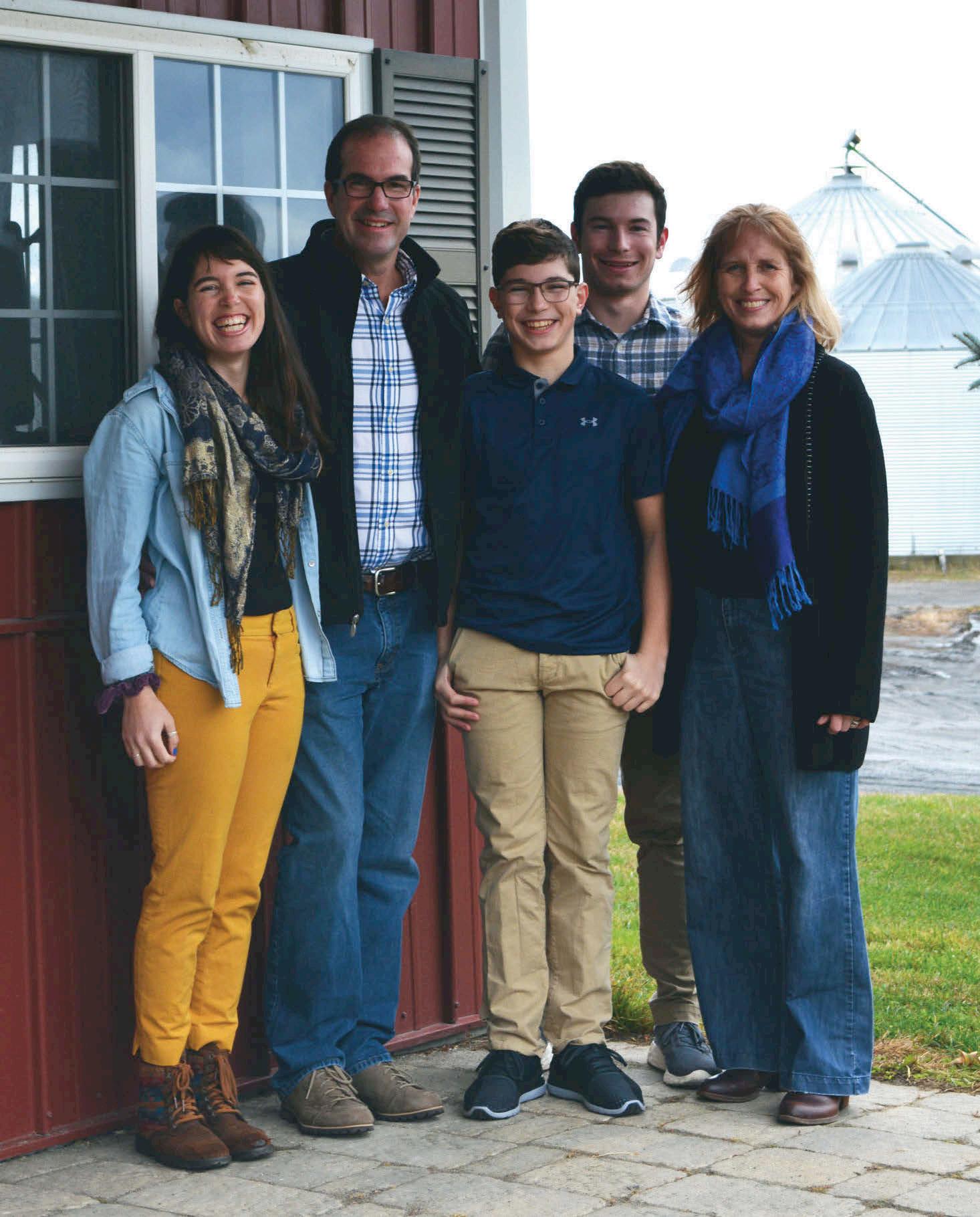

Steve Griffen (left) and Phil Griffen (right) posed for this photo on the sod field in front of their lineup of equipment during the early days of Saratoga Sod Farm.
insight early on. “I learned we had a good land resource. I liked that I could control my own product, could identify and develop customers, build relationships, and reach out to new customers. Farmers are optimists—we put seed in the ground and expect to make a good living.”
The family was introduced to the sod business by Phil’s fraternity brother who owned a nursery/landscape business in Princeton, New Jersey, and suggested they try sod. Typical of Phil (and Steve), he decided to research that option, joining TPI (American Sod Producers Association [ASPA] back then) in 1986. Phil attended the July 1986 Conference in St. Louis, MO, when the Field Day Host was the Keeven’s Emerald View Turf Farms. Steve says, “With help from growers that my father and I met through TPI, we started the sod business in August of 1986, planting 50 acres of Kentucky bluegrass just before I left for my senior year of college. Saratoga Sod Farm was launched.”
Sod was the perfect fit for their land base, with silt/loam in the river valley and glacial till sand on higher ground. Their location was ideal to serve multiple key markets. Steve added turfgrass management to his agricultural marketing and business management studies and received his B.S. from Cornell University in 1987.
Steve says, “We harvested our first load of sod in the fall of 1987. At that point we still had some beef cattle. We used some of the dairy buildings for our office and shop. As we reduced the herd, we increased sod production, tapping into our TPI networking resources, especially the McGoverns, DeBucks, and Lains. We’ve made lots of mistakes along the way, but it would have been many more without the sharing of information within the TPI family.”
Forming the Steve and Laurie Team
Steve met Laurie Keene at Cornell University where they were students in the College of Agriculture and Life Sciences (CALS). Both grew up on dairy farms and both of their Dads were Cornell graduates and fraternity brothers. Laurie’s Dad, Richard “Dick” Keene, was a Holstein breeder and an accredited and highly respected dairy cattle judge. He traveled worldwide judging the top shows. Steve and Laurie were active in 4-H, FFA, and Jr. Holstein Club and showed registered Holsteins. They both were on the Cornell Dairy Cattle Judging Team.
Laurie graduated in 1986 and worked in Boston in milk marketing. The couple married in 1989 and Laurie moved her marketing skills to the NYS Legislative Dairy Commission in Albany, in addition to assisting part time with the growing sod operation. She came into the company full time in 1992, joining Steve and Phil in helping the business grow and evolve to best serve the market.
Current Business Overview
Over time, the Griffens have diversified and expanded their turf varieties, harvesting methods, and services to meet a wide range of customer needs. Their customer base now extends from individual homeowners to landscapers, garden centers, golf courses, sports fields, youth sports leagues, cemeteries, schools, colleges, and towns. Forty percent of their market consists of sales to sports fields,
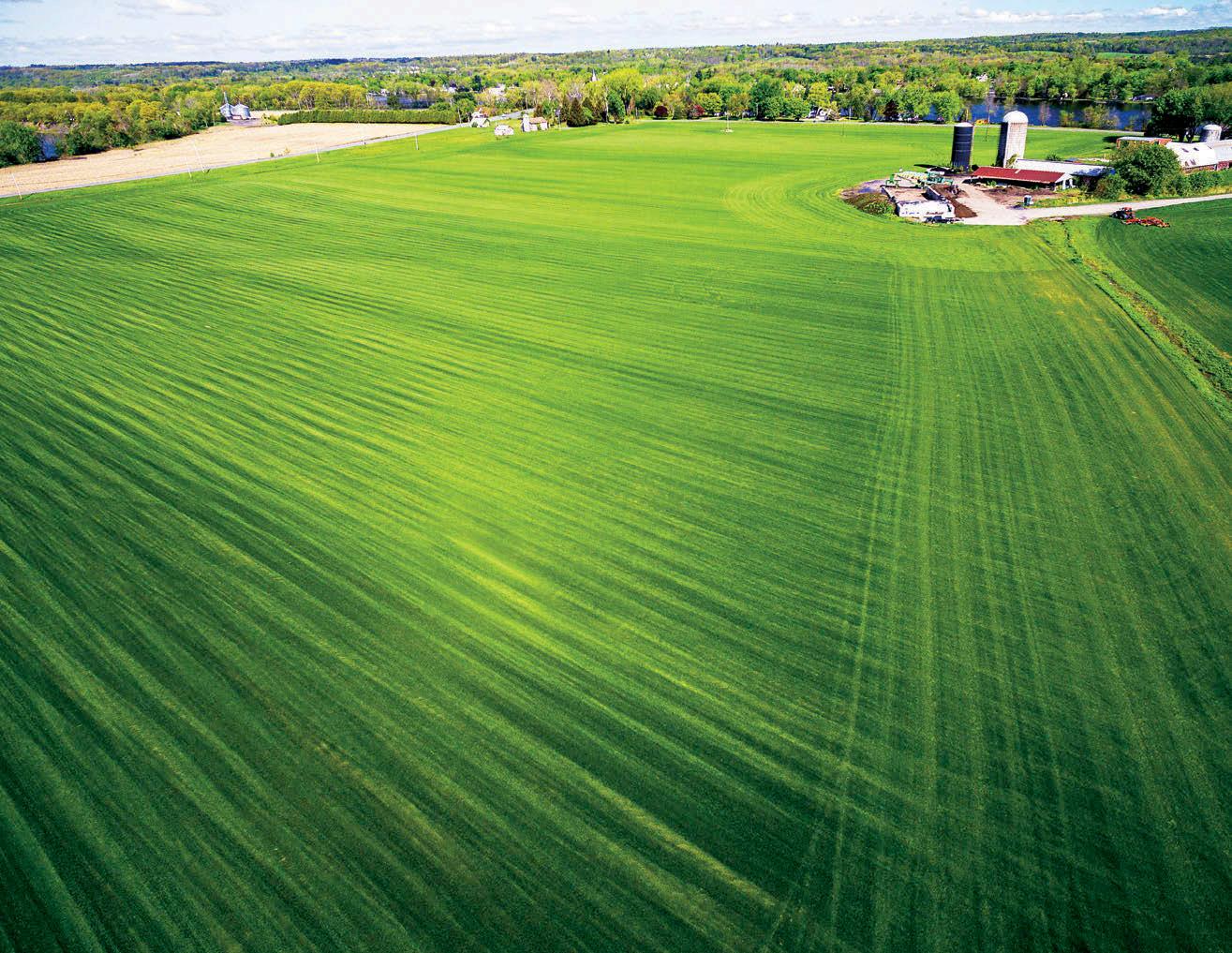
golf courses, and golf course companies. They supply sod for 20 independent garden centers and are part of the Harmony Outdoor Brands network. Among their highprofile projects over the years are the National Baseball Hall of Fame field, Saratoga National Golf Course, the NY state capital, West Point Military Academy, and training camp and practice fields for the New York Giants and Buffalo Bills professional football teams.
Saratoga Sod Farm currently grows approximately 700 acres of cool-season turfgrasses, including Kentucky bluegrass blends, fine fescue/bluegrass mixes, turf type tall fescue/bluegrass mixes, and creeping bentgrass. While most grasses are maintained at a height of 1.75 inches, they also offer a sand-based, lowcut .75-inch Kentucky bluegrass blend and sand based, fairway height bentgrass. During the peak growing season, sod fields are mowed every other day using a combination of rotary and reel mowers, with an average width of 30 feet. Sod is harvested in either standard palletized rolls (2 ft. x 5 ft.) or big rolls (4 ft. x 83 ft.) for golf course, sports fields, or larger commercial projects. When asked about their harvesting choices, Steve notes, “We now have two Trebro AutoStack IIs and two Magnum Big Roll harvesters, with a couple of tractor mounted Brouwers as backup, to harvest field edges, and to see if anyone still knows how to stack. That technology increased our efficiency and productivity and reduced our operating costs.”
Saratoga’s season depends on the weather. In 2020, they started cutting on March 8, just before being shut down by Covid. In 2019, they got a foot of snow each of the first three weeks of March, and steady rains after that, delaying cutting until April 15. Most years they can cut throughout November and into December, sometimes up to Christmas. Steve says, “We’ll sweep snow off the sod fields if necessary, to extend harvesting.” In addition, Saratoga Sod grows approximately 600 acres of corn and soybeans. Steve says, “That allows us to use crop rotation on the fields to replenish the soil and break the pest and weed cycles. It also gives us the diversity to adjust production for greater profitability. New sod fields are planted annually in August and are maintained for over a year before being harvested. A sod field harvested in late fall or early spring can be planted with short maturing soybeans that we can harvest in time to seed with turfgrass that fall.”
Steve and Laurie continue to invest in irrigation systems to ensure the quality and consistency of their products. Five center pivot systems operate on the sand-based fields and hard hose reels are used on the others. Row crops usually are not irrigated. The Hudson and Hoosic Rivers are their primary water sources. “Our pumps are diesel powered and are contained in soundproof buildings, so they can run all night if necessary,” Steve reports.
“We often incorporate chicken manure compost from a neighbor farm during field preparation and apply granular fertilizers using a variable rate enabled spreader,” Steve explains. Saratoga Sod incorporates additional environmentally sound farming methods including crop rotation, cover crops, integrated pest management, open ditching, subsurface tile drainage and field leveling; and the use of turf tires to reduce soil compaction.
The company owns seven tractor trailer trucks, all with Covered Wagon tarp systems, and two straight trucks. All carry portable forklifts for ease of loading and unloading at jobsites. Steve says, “Each of our trucks are assigned to one driver. All trucks are equipped with GPS, which is on all day, every day. We lose cell coverage in the mountains. GPS allows us to know where every truck is and if the delivery is on schedule. We pay our drivers by the hour and offer a sign-on and year-end bonus program.”
Steve adds, “We use GPS technology in both our sod and row crop production. We have eight tractors (five turf tractors and three tillage tractors) that are equipped with GPS and auto steer. Five of those have RTK (Real Time Kinematic) positioning receivers, which provide sub-inch accuracy. The precision process during field preparation, planting, and mowing saves time and money. The next step is to continue to mine the data we collect to maximize the use of variable rate planting, fertilizing and irrigation.”
To assist customers and sell more product, Saratoga Sod works in tandem with a subcontractor to provide a sod installation service. “We tried to do our own sod installation but weren’t very successful in making it profitable,” says Steve. “We worked with a neighbor to help him form his own sod installation business. We
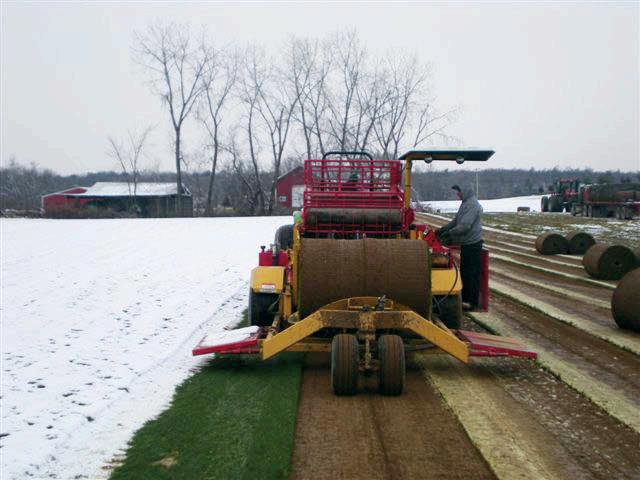
Most years, Saratoga Sod Farm can harvest into December, sweeping snow off the fields if necessary, to extend the season.
provide him leads and do all the billing. He is paid on job completion. That business has grown to ten employees working in up to three crews. We use his services when customers want us to install for them. We also have landscape contractors who provide installation, and we refer customers to them as well.”
In 2008, Saratoga Sod Farm became a supplier of the BigYellowBag® black garden soil and black mulch. Steve says, “It’s a great way to maximize the use of our assets. Also, it keeps our people engaged with marketing, sales, blending, bag filling, and delivering. The exposure we gain from bags placed all over our marketing area is huge. It’s all retail sales and has been a good addition to our product line.” They also offer a full line of seed and fertilizer products.
Managing the Workload
There’s plenty of work to do at Saratoga Sod, so the Griffens divide the responsibilities. Laurie says, “Steve is hands-on management on the production side and I’m hands-on in the office.” They handle the long-range and financial planning and analysis together.
Steve oversees the production team while Laurie manages the office staff and sales associates. Steve and Laurie both interact daily with their company drivers, with Laurie serving as dispatcher. Laurie also handles outside sales to golf courses, sports fields, and the landscapers.
Steve says, “Because Laurie and her office staff do a great job, I’m able to spend much of my time outdoors, but I still drive a desk more than I want to. I’ve learned that I need to get off the tractor sometimes to better analyze what’s happening on the fields. The best fertilizer is still the farmer’s footprints, along with satellite or drone imagery.”
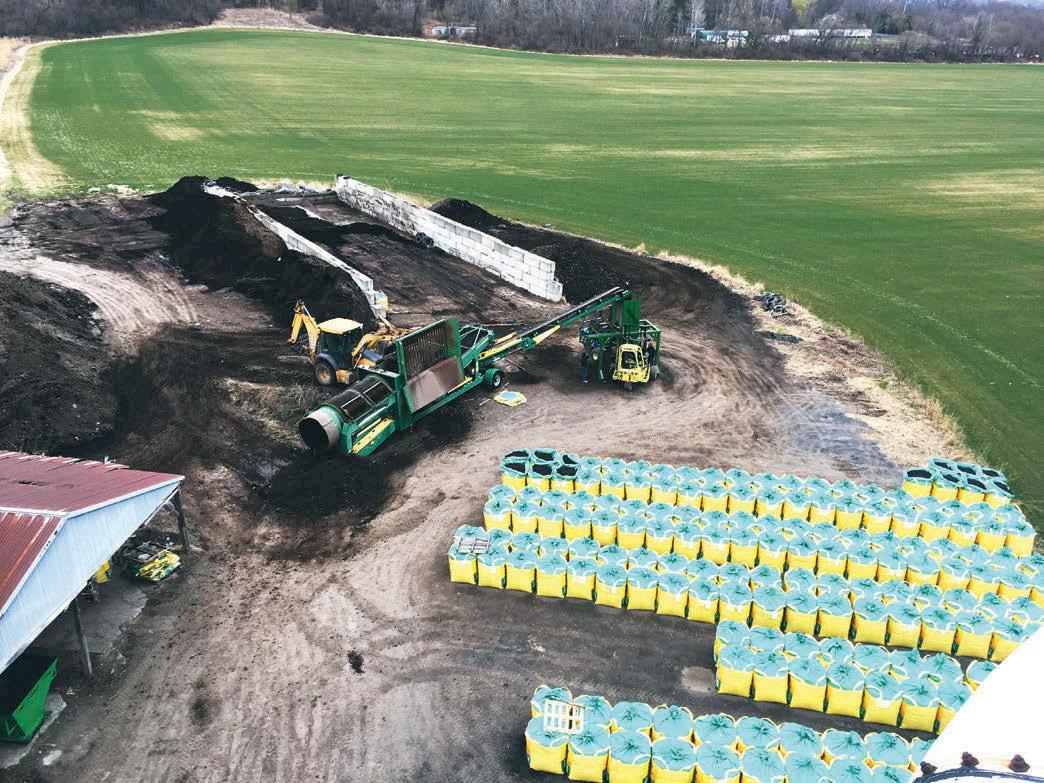
This aerial view shows the Saratoga Sod Farm’s BigYellowBag® blending and bag filling site. Steve and Laurie credit their company growth to their team. As Steve says, “… our greatest resource is our people.” This photo was taken during the team’s annual “end of season” dinner in 2019.
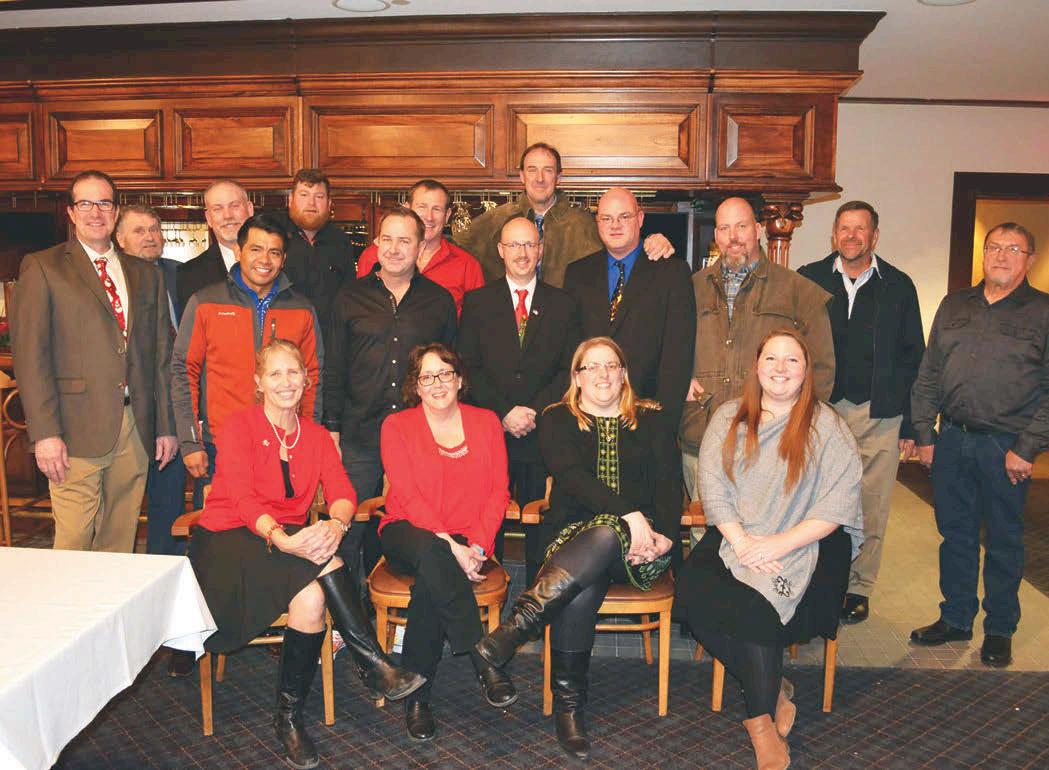
Saratoga Sod depends on 20 full and part-time team members to get the job done every day. “Our growth has come because we have a great team,” says Steve. “As good as the technology has become, our greatest resource is our people. Rather than adopt strategies to motivate employees, my goal is to find motivated people who want to do good work, and then get out of their way so they can do their jobs. Having really good people is what enables Laurie and me to do what we do.”
Saratoga utilizes the H-2A program. Steve says, “There have been times that we had to try 15 locals to find one that worked. Our H-2A workers handle all our mowing, most of our harvesting, and much of the BigYellowBag production. They are smart, conscientious, and talented members of our team with positive attitudes and they do what it takes to succeed.”
“As a company, we want to exceed expectations, so we strive to empower our people” says Laurie. “We do a lot of technical training and customer service training and we also cross train our staff.” Steve adds, “For example, our mechanic can also combine corn, harvest sod, or even make an occasional sod delivery if needed. We don’t have to tell our people what to do; they know what their jobs are, and beyond that, they see what needs to be done and do it.”
Most of Saratoga’s personnel have been with them 10 years or more. “One of our drivers started in 1990 on the back of a sod harvester,” Steve reports. “One of our middle managers has been with us almost 20 years. He has raised his family while living in a house on the sod farm.”
Coping with Challenges
Weather challenges are a given in any type of farming, and Saratoga Sod has faced several of them. Steve says, “We had bad flooding issues in 2011. Massive rains in the spring brought flooding to within 3-inches of our office door. We had 400 acres underwater for several days, but we only lost 10 acres of sod. Then, in late August, came Hurricane Irene followed by Tropical Storm Lee. We had 16 inches of rain in 4 days. That’s a lot when you’re surrounded by mountains. It covered everything, wiped out roadways, shut down all business for an extended period. We lost 60 acres of sod with that one. The silver lining was that we were still able to dry out, repair the land, and replant that fall.”
Other challenges are totally unexpected, like the corona virus pandemic. “New York was at the ‘tip of the spear’ with the major Covid-19 outbreak centered in New York City,” says Steve. “The Governor issued the first restrictions on March 24, closing all nonessential businesses.” Laurie adds, “Policies were changing daily. Our governor treated the state as a single entity, with no regional approach based on Covid numbers until the end of May. We closed our office at first, then our office staff worked remotely for nearly a month before bringing staff back. All order pickups were no contact and all our transactions were paperless. Our shop and field staff kept working while wearing masks and maintaining social distancing.”
Essential and nonessential business designations kept changing. Steve says, “Our state Department of Agriculture first classified ornamental horticulture as nonessential, but because we grow row crops and our soil business was used for gardening, we could still operate. Then they allowed us to supply sod for governmental work, such as public buildings and school sports fields, and directly to the homeowner, but landscapers could not install sod for homeowners. Interstate movement of goods has been allowed from the beginning, but our drivers must comply with each state’s restrictions. With the fall resurgence, restrictions were tightened again, so we’re keeping our non-contact pickup, masking, and social distancing. It’s been like walking a tightrope, but we’re serving our customers and keeping our staff working.”
The TPI Connection— Looking Forward
Steve attended his first TPI conference in February of 1987 in Hollywood, Florida. He says, “The educational sessions and exhibitor interaction were great. Even more helpful was the involvement that goes on between sessions and in the evenings. The TPI family is more than an expression; it’s a reflection of the character of the association. We want to help each other. We all go through things together and can get help from those that have weathered similar, or even the same, challenges. I know we’ll never be able to thank all of those who have helped us.”
Steve started serving on the Board of Trustees in July of 2015 and has been on quite a journey since then. He was part of the search committee that identified Dr. Casey Reynolds to fill the position of TPI’s Executive Director. He took part in development of the strategic plan that has been guiding the association’s progress the last few years. He also served as Secretary-Treasurer and as Vice President before stepping up to his current role as TPI President.
Steve says, “As a member organization, the board and staff work together to help our members be successful. My job now is to facilitate that. We have a strong board with years of experience representing a broad range of members. Our members have lots of great ideas; we need to listen to them, turn those suggestions into successful initiatives and act on them. We also need to work to expand our membership so others can experience the benefits of TPI.
“The major issue we’ve zeroed in on is the public relations campaign promoting natural grass. We have a solid foundation already and there’s potential through the proposed Sod Checkoff Program to generate the funds to make a big impact on the natural grass sod industry. We have to fight misinformation from the synthetic turf industry and those who say natural grass is bad for the environment. We need to tell our side of the story—and it’s a great story. We need to show people what the scientific research confirms about the environmental, economic, safety and health, and emotional benefits of natural grass. The Sod Checkoff Program will help to grow and improve our industry to the benefit of all producers.”
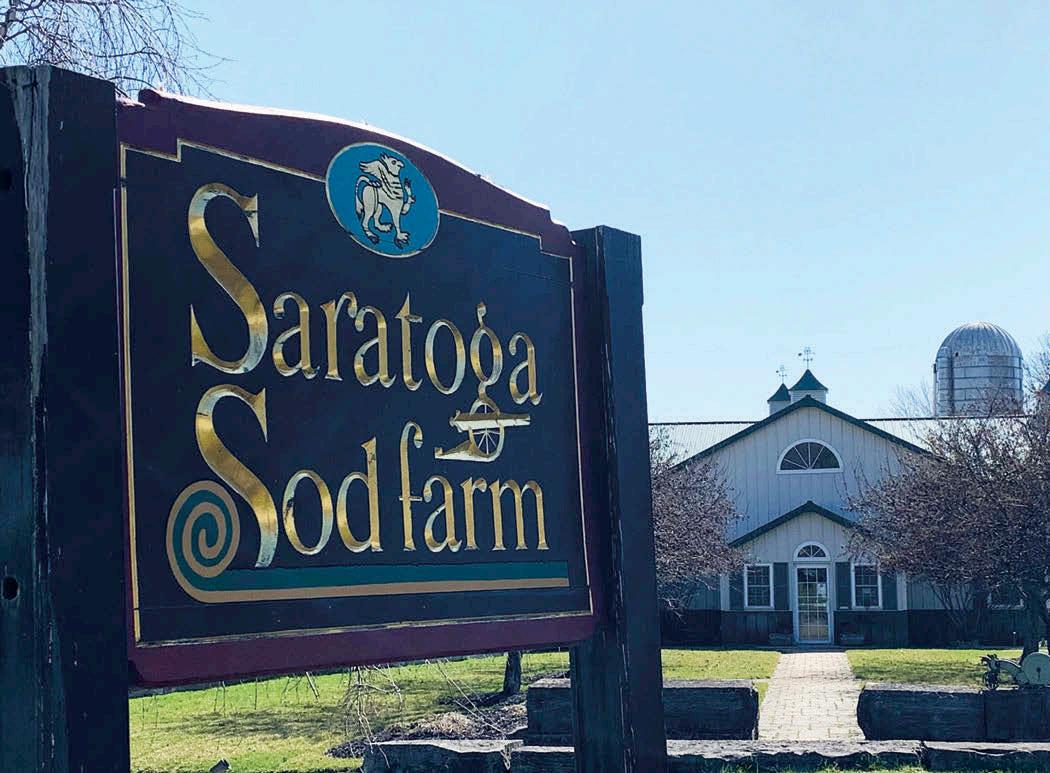
This photo shows the Saratoga Sod Farm sign and office building.
The Legacy of Service Continues
Both Steve’s Dad, Phil Griffen, and Laurie’s Dad, Dick Keene, were well respected leaders of both community and industry-related associations. Dick passed away on July 25, 2014. Phil passed away on May 29, 2017. But their legacy of service lives on in Steve and Laurie.
Steve is a Past President of the New York State Turfgrass Association (NYSTA) and received that association’s Citation of Merit award. He also served as Chair of The Empire State Council of Ag Organizations and was Vice Chair of the NY Farm Viability Institute.
Laurie says, “Steve was instrumental in setting up the State Lobbying Day which brings the turfgrass community together to interact with legislators to provide advocacy for all of the green industry. It provides a training session for those new to the effort and equips participants with issue statements and talking points to address governmental issues that impact Ag. It’s been going on for 16 or 17 years now.”
Steve says, “The connections made through these lobbying efforts have been helpful. We formed a coalition of Green Industry groups called the NY Alliance for Environmental Concerns (NYAFEC) and raised enough money to hire a professional lobbyist to track priority issues and educate legislators. We’re not just reactive, but also proactive, putting issues in front of them that they can help us with. By building advocacy relationships, we can be more influential. NYSTA is an associate member of NY Farm Bureau. NYSTA participates in their lobby days and they participate in ours. We’re also part of the Council of Ag Organizations that jointly develops a policy book so that we speak with a unanimous voice whenever we talk with legislators.”
Laurie has served on the Board of Directors of Farm Credit East for 12 years and is currently Board Chair. Farm Credit East is a farmer-owned cooperative lender that deals with agriculture, commercial fishing, and forest products in seven Northeastern states. She is a graduate of Cornell University’s LEAD NY leadership program and has served on its board and as president. She also currently serves on the Town of Saratoga Planning board as Vice Chair.
Steve and Laurie served as NY Farm Bureau Young Farmer Committee Co-Chairs, both have assisted with 4-H, were Chairs of Saratoga County Cooperative Extension at different times, and both served on the Cornell Ag Advisory Council, just as their Dads did.
Laurie says, “We’re not on all those boards at the same time. We rotate our involvement and it’s spread over about 30 years. We’ve learned to have the proper balance. If we try to do too much, we’re not effective at any of it.” Steve notes, “One of the advantages of farming is its seasonality. Winter is the meeting season. Though this year, with our meetings online, it seems we’re meeting almost every day of the year.”
Laurie says, “As you know, things are run by those who show up.” And Steve adds, “You learn as you interact, and you gain as much as you give. To us, it’s a big part of running a business, and our business is better because of our involvement.”
In 2015, that better business was recognized when Saratoga Sod Farm received the New York State Agricultural Society Business of the Year Award. The presentation stated, “Fueled by their customers’ passion and the growth of their diversified operations, Saratoga Sod Farm demonstrates the innovation and leadership worthy of this award.” Steve and Laurie also were recognized by their Alma Mater as Outstanding Young Alumni in 2003.
Steve and Laurie are active in the Quaker Springs United Methodist Church and currently serve as auditor and Trustee, respectively. Laurie says, “The church was built with wood from Steve’s great, great grandfather’s sawmill. The wood in our 1860 farmhouse is from that mill, too. Steve’s great grandfather helped build the church.” Steve says, “It’s a little country church in the middle of nowhere. But though the church is old, we’re New Testament people; we believe in the power of prayer; we believe in love and forgiveness.”
Family Takes Priority
Although the business is consuming at times, family takes priority for Steve and Laurie. They’ve always found ways to encourage and support their three children in their educational and recreational endeavors, whatever the season or circumstances. It’s just what they do. Steve and Laurie have each coached their kids’ youth sports
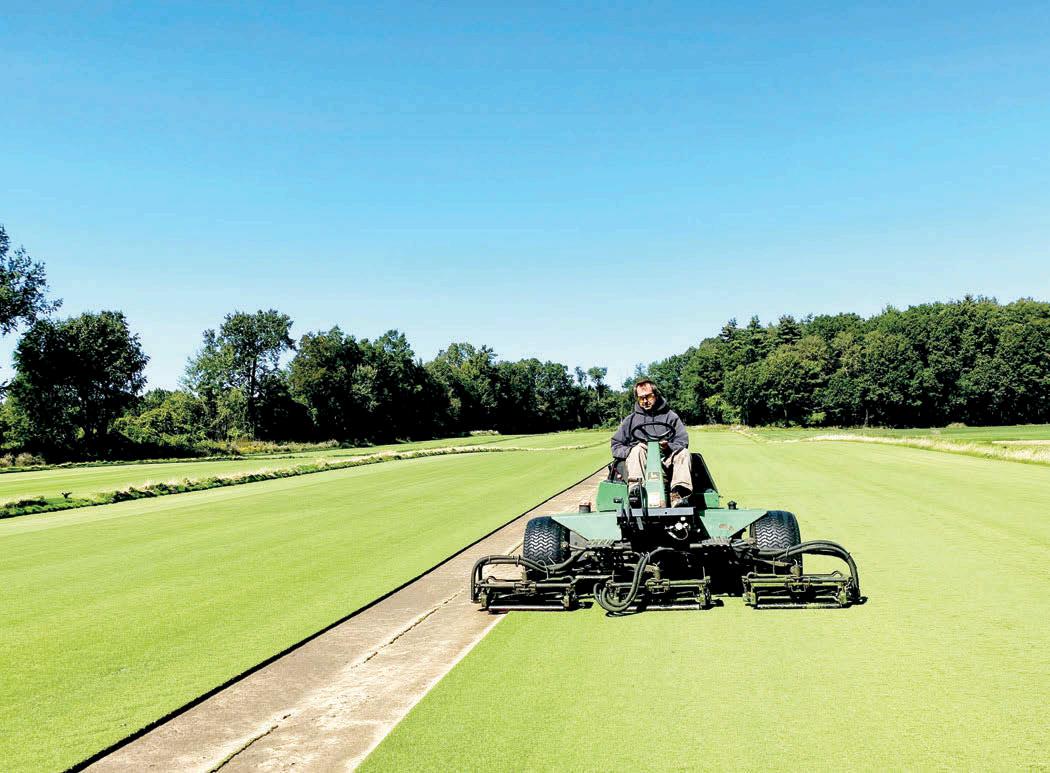
During the peak growing season, sod fields are mowed every other day. Here a team member is mowing a bentgrass field.
teams over the years. Steve says, “There is nothing more rewarding than seeing the joy in the face of a young person when they have gained the confidence and ability to achieve success.”
Their daughter, Alexandra (Alex) is 28. A graduate of Cornell, she taught in Colorado for four years and is now living in Saratoga. Alex is currently Assistant Program Director for the Double H Ranch “Hole in the Woods” Camp, located inside New York’s Adirondack Park. Co-founded by Charles R. Wood and Paul Newman, the camp “provides specialized programs and year-round support for children and their families dealing with lifethreatening illnesses. All programs are free of charge.” Steve says, “Alex loves it. They work with kids with all kinds of serious medical conditions, developing a program that allows them to do ‘normal’ kid’s camp activities.”
Their son, William (Will), is 22. He graduated from Cornell in May of 2020 and is working full time as a Credit Analyst for Farm Credit East at their Greenwich branch in the neighboring town. Laurie says, “Will hit six months on the job at the end of November and really likes what he’s doing there.”
Their youngest, Lucius (Luke), is 13. Steve says, “He’s a positive kid, full of life and inquisitive. He’s interested in sports and is a great help on the farm.” Laurie says, “Dealing with the Covid impact on school has been tough on all the kids socially. Classes are split between onsite and online, and all school sports are shut down. It’s disappointing, and challenging, but overall, Luke is handling it well. He’s got more time to go four wheeling, hunting, fishing, and boating.”
Need Fun Times Too
According to Steve, “Fun is underrated. It’s as important to the quality of life as work; and just as necessary.” Steve and Laurie take their team and spouses to a nice end of season dinner annually, and have a company picnic each summer. And they love getting together for fun times with family and friends.
Steve says, “We’ve done quite a bit of traveling and skiing as a family.” Laurie says, “Alex is a big hiker and climber who likes to explore the back country. She’d like all of us to join her and usually can at least get one of us to go along.” Steve and the boys like to hunt. He says, “My deer stand is in a great spot, about 75 yards away from the boundary of the national park.”
The Griffen’s main recreation spot is a camping area about a half-mile behind their home on the bank of the Hudson River. They have a dock and boat on the river and recently added a patio and a big fire pit. “Big enough to burn old pallets,” says Laurie. “We have a camper parked there, too. We spend any spare time we can there in the summers.” Steve says, “We’ve done a lot of tubing, water skiing, and wake boarding there and they’re all still popular with the kids. I’ve switched mostly to wake surfing. With wake surfing at 9 or 10 miles an hour, if you fall, you just slip into the water, not hit it with your face.”
Laurie adds, “Will’s high school football team played in the state finals at the Dome in Syracuse. We always had their Thursday night dinners in our shop, and they would go to our campsite after their Friday night games. Now it’s become their young adult hangout.”
Steve has four sisters. “We have a big Cousins’ Camp there for all of them and their families around the Fourth of July,” says Laurie. “With the families not growing up near each other, the annual camp became their way to connect. Now, with many of the kids out of college, and getting married, the family is spread out even more. For the last Cousins’ Camp every one of the 15 ‘kids’ came from all over the country.” Steve says, “My Mom loves seeing the grandkids all together. One of our customers owns a tent business, so we got a big circustype tent from him. Everyone pitches their tents on the sod field; each family picks a night to make dinner; and we have a big fire in the pit every night. One highlight is our annual, fairly competitive, family volleyball tournament—complete with the coveted trophy that the kids salvaged from the school dumpster years ago.”
While Steve and Laurie are busy people, they strive to find the right balance to make the most of all opportunities. And they have fun doing it.
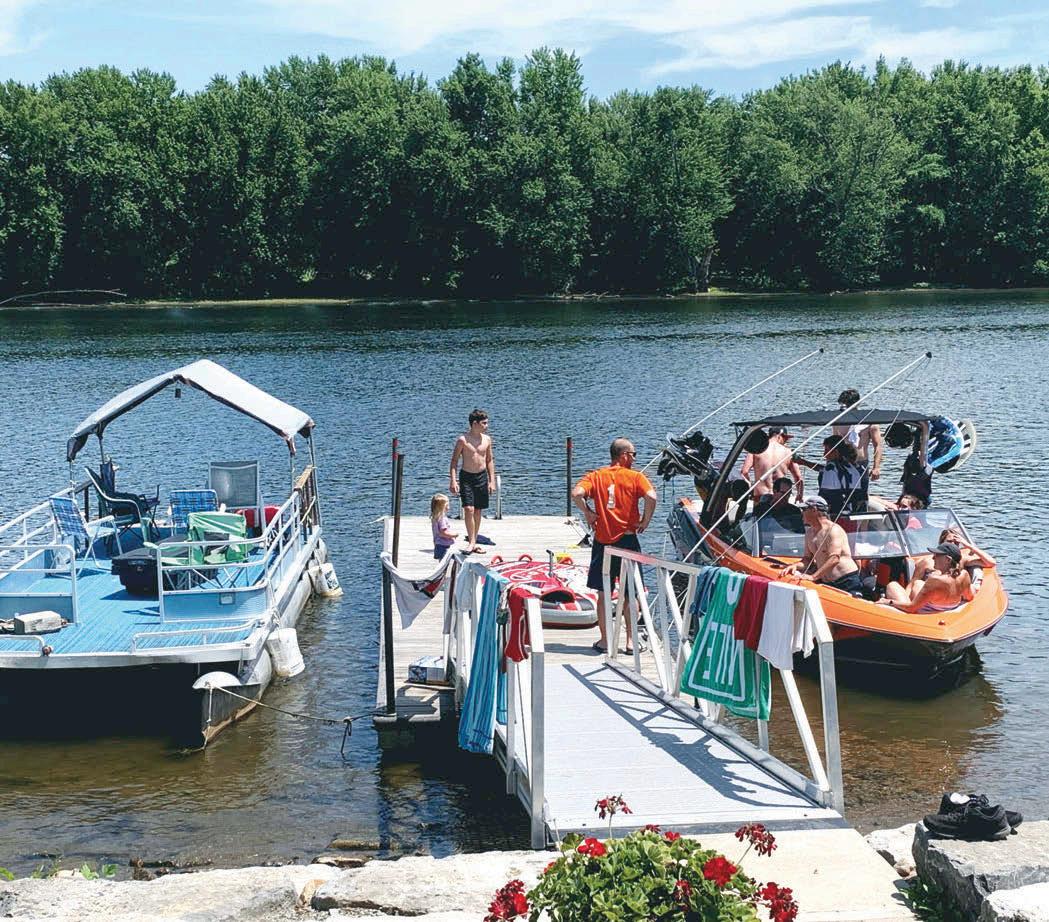
There’s lots of activity around the dock during the annual “Cousins’ Camp” gathering at the Griffen family’s main recreation spot on the bank of the Hudson River.
Suz Trusty is co-editor of Turf News. All photos courtesy of Steve and Laurie Griffen and Saratoga Sod Farm.





